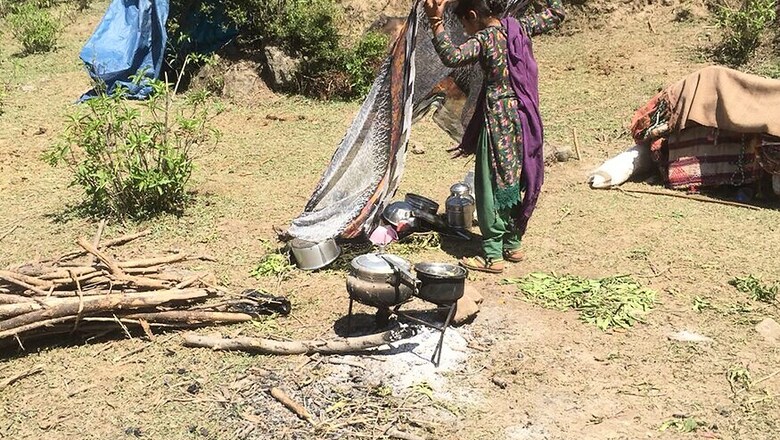
views
The three Gujjar women sit huddled together in a corner of an empty, dusty room in a mud house in Rasana, Kathua – the epicentre of the gruesome rape and murder of an eight-year-old girl from the minority Gujjar community.
The faces of the women, etched with grief and resignation, remain wrapped in a veil of silence. While the arrest of the accused involved in the heinous crime by the crime branch has brought some relief to these women, a constant fear and insecurity has gripped them.
Sitting in the corner of the room the three women – all from three different nearby small villages – pitch in the same voice when asked about the aftermath of the incident.
“An eight-year-old was raped, killed and then her dead body was dumped in the forest. Should we not fear for our and our children’s lives?” the women asked.
Unlike menfolk of the village, who are roaming around the areas freely, the womenfolk of the area, since the rape and murder of the minor, has almost restricted themselves to their homes and are more cautious with going out to graze their cattle.
“Earlier we used to move out freely. Now, we think twice before stepping out. Even if people say that there is no fear, we still have to think about our safety,” one of the women said.
The menfolk of the village also voice similar concerns. However, they accept that it is mostly the women and children of the community who are feeling scared.
Jabbar Muhamad, a resident of Rasana, is a father of two daughters and son. All three of them are teenagers. After the gruesome incident, Muhammad has been making sure to keep a close watch on his daughters who help the cattle graze in the nearby forests.
“We ruled these mountains once. Our grandfathers and fathers have lived in these mountains. Now suddenly we are being made to feel so insecure and helpless. Our children are scared,” he said.
Muhammad, however, acknowledged that today they aren’t as apprehensive as they were when the crime branch was carrying the investigation. But, in the same breath, the father of three said, “The tension still hangs heavy in the air”.
“During the initial days of the incident, we feared that we might also be attacked following the uneasy calm prevailing in the area. By God’s grace nothing of that sort happened. But there were other ways through which we were intimidated,” Muhammad said.
He was referring to the incident when the minor was buried a few kilometres away from their ancestral graveyard after “some people objected the burial in the village”.
Siraj Khan, another resident of the village, explained what had transpired.
“We [Bakerwals] had purchased a piece of land for graveyard nearly 15 years ago and have buried many members of our community there. But when we tried to bury her [the minor] in that graveyard some people from the village obstructed,” Khan narrated.
The body of the minor was then taken to the nearby forest for burial.
Khan, however, says that this was not “any stray incident”. Days after some of the locals snapped the water supply to a few households of the community.
“Why would someone do that?” Khan asked, only to answer the question himself. “They wanted to scare us away. But we won’t leave our land.”
People from other communities – Hindus, Muslims and Sikhs alike – however, are trying to distance themselves from the allegations made by the Gujjars and Bakerwals of the area.
Shiv Kumar, a resident of Rasana, believes that “the Gujjars and Bakerwals are unnecessarily barking up the wrong tree”.
“Everyone here is sad after knowing what happened to the minor girl. All of us want the culprits to be punished. But nobody has hurt them [Gujjars and Bakerwals]. I don’t know why they would make an issue out of this and blame us for snapping their water supply or other things,” Kumar said.
While most of this can’t be confirmed through independent sources, altercations between tribals of the area and other communities have happened before.
According to the locals, earlier also, a series of incidents were “manufactured” to “instill fear among the community”.
“A youth from our community was killed. Others were beaten in separate incidents. The MLAs have been threatening us. How can these things go unnoticed?” a member of the Gujjar community said.
He was referring to a series of ‘unconnected events’ where Gujjars and Bakerwals were at the receiving ends either in the police action or by the other locals of the area.
In February 2016, a controversial land eviction drive led to the killing of a youth from Gujjar community in Sarore area of Samba. Some miscreants had then allegedly torched more than 30 makeshift huts of the Gujjar community.
In May 2016, forest minister Choudhary Lal Singh of the BJP allegedly went to the extent of threatening the Gujjars with a repeat of the 1947 massacre of Muslims. When a Gujjar delegation visited Lal Singh with an issue pertaining to their orchard land, he told them if they had “forgotten 1947”.
In 2017, self-proclaimed cow vigilantes in Reasi area of Jammu attacked five members of a Bakerwal family.
“Events like these were already happening. And then they did this brutal crime,” one of the locals, who wished not to be named, said.
The two communities – Gujjars and Bakerwals – together form 11% of J&K’s population and were designated a Scheduled Tribe in 1991. The Gujjars are settled in several parts of Jammu through the Chenab Valley and the nomadic sheep and goat-herding Bakerwal migrate with their flock to Kashmir and Ladakh in the summer and to Jammu in the winter, camping at forest sites they have used for centuries.
This fear is also noticeable among other people from the Gujjar and Bakerwal community living in Dumahayal, Kutah and Kanaah hamlets of Hira Nagar area of Kathua district.
Much of what transpired during the days when the minor girl was being kept as a hostage and repeatedly raped by the accused was unclear in these villages. Clouded by rumours during those days, most of the Gujjar and Bakerwal community of these villages thought things to remain normal. However, when the horrific crime came to light, things changed for them as well.
“Our children are still in shock. Many of them now don’t go out to play or take livestock for grazing. We don’t allow them to move out after five in the evening,” Mubarak Ali, a resident of Kutah said.




















Comments
0 comment